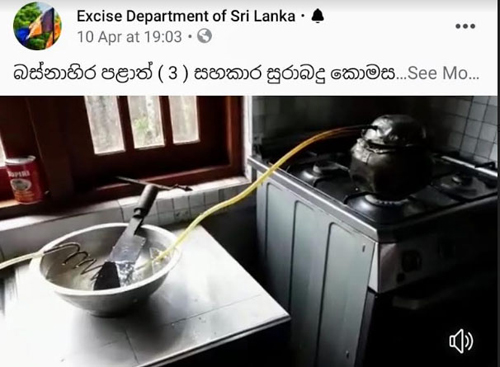News
Guess what’s brewing in some Lankan kitchens?

Makeshift distillery in a kitchen: A screen shot from a video posted by the Excise Deparment on its Facebook page
The bars closed on March 21 and Sri Lanka’s “daily drink workers”—urban, rural, everywhere—are using grade school education to liquor up.
The new national hobby has left the Excise officials scratching their collective heads. They cannot very well creep into kitchens and seize fruit. But kitchens are where the action is.
Everything from grapes and dates to beets and pineapples are chopped up and dunked into yeast, water and sugar and left to ferment. Jaggery is another popular ingredient.
The faint of heart strain the murky, sweet liquid and drink it neat, dregs and all. The more adventurous use rudimentary utensils to distill the stuff on stove tops. Home brewing has never been more popular. Even your basic “petti kade” has the ingredients. And liquor production has shot up so high that even supermarket chains needed to restock yeast.
Drinkers have taken their solidarity online. There are social media pages dedicated to home brewers where commentators share and ask for tips and recipes—or joke about how the next lot will end up in hospital for having got the formula wrong.
Others deliver expertise via YouTube videos or WhatsApp groups. Or question each other, forlornly and rhetorically: “When will the bars open, machang?”
That depends on when the coronavirus leaves the country, says Kapila Kumarasinghe, Deputy Commissioner of Excise and head of the Department’s Excise Ops Room for COVID-19. His office has set up five extra units in an effort to stem the flow of illicit liquor—mass-scale moonshine production, included—amidst issuing permits for ethanol (denatured under supervision to make it unsuitable for human consumption) to be used in hand-sanitiser manufacturing.
When the Government first declared a three-day holiday on March 17, crowds jostled outside liquor shops to stock up. No one-metre rule, here. The response was to order all outlets shut, even during curfew shopping breaks. In the Northern, Southern and Central provinces, they are sealed to make doubly sure there are no leaks.
The goal was to stop group behaviour, mostly “drinking parties”, and to avoid chaos during shopping intervals. “Don’t you know our people,” Mr Kumarasinghe said. “These days, even if you have a ‘kale’ [quarter] bottle with you, everyone will definitely come and surround your house.”
Bunching around bottles—usually till the last drop is imbibed—is a countrywide phenomenon.
It was later found, too, that some Sri Lankan returnees from Italy had defied self-isolation orders to host their gatherings around the foreign liquor they had brought back. The problem is more pronounced in rural areas where homes have large back gardens hidden from view.
Initially, people in urban centres ordered alcohol via companies licensed to deliver provisions. Stern warnings put a stop to that. Black market sales rocketed. “There was a thriving underground business going on,” said Mr Kumarasinghe. “When we went to seal the shops, most were nearly empty. Everything was already taken out.”
Even a bottle of “gal” or extra special coconut arrack hawked for between Rs 4,000 and 5,000 (usual price: Rs 1,850). Now, there are no stocks to be had, even at extortionate prices. Excise once stopped two luxury vehicles distributing orders in the Badulla and Puttalam districts. And two branches belonging to two supermarket chains were also sealed after they were found to have been selling liquor in violation of Government directives.
Meanwhile, “kasippu”, a perennial headache, is a bigger problem now because output has expanded to meet demand. On April 13, Excise officials arrested two men brewing liquor in 36 barrels in the Ja Ela, Ekala and Othikele areas.
This scrambling to meet demand could turn lethal as the manufacturers go for commercial production and higher profit margins. “They will want more quantity so we don’t know what they will mix into the kasippu,” Mr Kumarasinghe warned.
Despite the pervasiveness of home brewing, the Excise Department doesn’t see it becoming a long-term pastime. “Right now we can see high growth but it won’t happen after that, I think,” Mr Kumarasinghe said.
“If it continues, they know the punishment,” he reflected. “At this time, the police or Excise officers can’t reach them. But once the liquor shops open, they won’t take the risk. Especially, the decent crowd because their reputation will be ruined.”
There may be a lot of ingredients going into the daily tipple at the moment—but decency is not yet in the mix.


